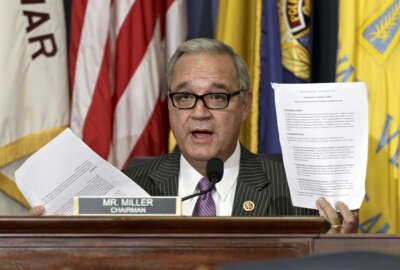Top leaders at the Veterans Affairs Department are urging Congress to immediately repeal recent restrictions on the agency’s performance award and incentive spending.
A provision tucked in a relatively new law requires that VA cut its spending on awards and incentives by 20 percent this year compared to 2015, the department’s deputy secretary, Sloan Gibson, said in a Dec. 19 letter to the House Veterans Affairs Committee.
Congress included cuts to VA awards and incentives spending in the Comprehensive Addiction and Recovery Act of 2016 (CARA) , which passed back in July. The law, which mostly covers opioid-addiction treatment programs and specifies how the departments of Health and Human Services, Justice and Veterans Affairs should administer them, also limits VA’s spending on bonuses from 2017 through 2024.
The CARA cuts will have other impacts, Gibson said.
“Because CARA lumps the “recruitment, relocation and retention (3Rs) incentives under the same cap as performance awards, it will require a nearly 30 percent cut in individual performance based awards this year over last year,” he said.
Agencies often have the flexibility to offer recruitment, relocation and retention incentives as a way to bring in or keep qualified talent.
Roughly 20 percent of VA’s workforce and 35 percent of the agency’s SES are new to the department since 2014, when news broke of the wait list crisis at the Phoenix VA medical center.
Gibson temporarily suspended bonuses for senior executives back in 2014, when several VA hospitals were under investigation. But now, he said these new employees shouldn’t be punished for issues that happened before their time.
The caps come at an especially difficult time, Gibson said, because the department is in the middle of making changes under VA Secretary Bob McDonald’s MyVA Transformation plan.
“No organization can transform for the benefit of its customers without meaningfully incentivizing, recognizing and rewarding its high-performing employees,” Gibson said. “To ensure that the new administration is able to complete VA’s transformation, the Secretary and I implore the committee to work to repeal the CARA caps and to stop singling out VA employees for disparate treatment.”
House Veterans Affairs Committee Chairman Jeff Miller (R-Fla.) said he had no plans to repeal the bonus provision in the CARA law and recognized that committees in both chambers made some tough decisions when negotiating the bill.
“Among those difficult decisions were choices regarding how to ensure certain veteran provisions, critical for inclusion in the CARA, had the funding needed to earn congressional approval,” Miller wrote in Dec. 20 letter in response to Gibson. “Ultimately, the conferees agreed that a limitation on VA employee awards and incentives offered the best option for redirecting limited resources toward immediately impacting the lives of fragile veterans suffering from addiction.”
The House committee hasn’t received an alternate proposal from VA suggesting a different way the department could fund these opioid-addiction treatment programs, Miller added.
Yet Gibson’s letter expresses a deep-seated frustration with Congress, specifically with a variety of recent bills proposed this year that he said “would single out VA employees” and their due process rights, retirement benefits and performance incentives.
“Reforms that target a single agency severely compromise that agency’s ability to retain and recruit top talent,” Gibson said. “Changes that target only VA employees within the federal government — that adversely affect VA talented leaders, health care professionals and other service providers — ultimately hurt the veterans VA is privileged to serve.”
Miller introduced a bill earlier this year that would change the VA Secretary’s authority for disciplining and firing senior executives. The VA Accountability First and Appeals Modernization Act would have shortened the time that VA employees and senior executives could appeal disciplinary actions and removals. It also would have cut the Merit Systems Protection Board out of the appeals process for SES members. The legislation passed the House but never made it to the Senate.
A proposal to cut bonuses altogether for VA senior executives has popped up in different bills over the past two years.
Congress began criticizing the department’s bonus and performance appraisal system in earnest about two years ago. During the past four fiscal years leading up to the aftermath of the Phoenix wait time scandal, all 470 of VA’s senior executives had earned a “successful” performance rating.
The number of VA senior executives who receive performance awards has varied over the past few years. About 64 percent of SES at the department got a bonus in fiscal 2014, while nearly 36 percent received one in 2014.
Roughly 74 percent of senior executives at VA received a bonus last fiscal year, according to the Office of Personnel Management’s most recent numbers.
Copyright
© 2024 Federal News Network. All rights reserved. This website is not intended for users located within the European Economic Area.
